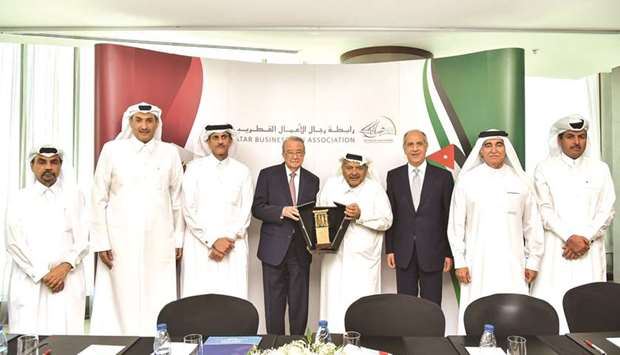The country’s leading captains of industry met with a high-level delegation from the Jordanian Businessmen Association (JBA) during the Qatar-Jordan Joint Business Council hosted by the Qatari Businessmen Association (QBA) yesterday in Doha.
The council, which was headed by QBA chairman HE Sheikh Faisal bin Qassim al-Thani and JBA chairman Hamdi al-Taba’a, discussed major topics of co-operation in the presence of Jordanian ambassador Zeid al-Lawzi.
QBA board members present in the meeting include Dr Sheikh Khalid bin Thani al-Thani, Sheikh Nawaf bin Nasser al-Thani, Saud al-Mana, and Abdulsalam Abu Issa, as well as QBA members Sheikh Faisal bin Fahad al-Thani, Maqbool Khalfan, Ihsan al-Khiyami, Mohamed Althaf, Sheikh Nasser bin Nawaf bin Thani al-Thani, and QBA deputy GM Sarah Abdalla.
The meeting was also attended my members of the Qatari Businesswomen Association (QBWA), and representatives from the Qatar Free Zone Authority (QFZA), Single Window Committee, and Qatar Financial Centre (QFC) who delivered several presentations.
“It is our utmost pleasure to activate the Qatar-Jordanian Business Council, which includes a number of prominent businessmen from both sides. This is an important step in the QBA’s series of events that aim at enhancing and increasing communication between businessmen worldwide, thus paving the way for businessmen in Qatar and Jordan to establish trade and investment partnerships,” Sheikh Faisal said in a speech.
According to Sheikh Faisal, Jordan is characterised by its transparent investment environment and practising governance systems, and enjoys legislative stability in addition to security, safety, and customs and tax exemptions for investment projects.
Sheikh Faisal noted that this makes Jordan an attractive environment for Qatari investors whose current investments amount to nearly $2bn in various sectors, including energy, real estate, stock exchange, banks, tourism services, education, and health. He also stressed that there is a plan to increase Qatari investments in Jordan over the next three years.
Sheikh Faisal said Qatar’s economic growth transformed it into a major destination for regional and international investments. He said the government is offering incentive packages, including the investment law that allows 100% ownership in most economic sectors, in addition to logistics components, such as the Hamad International Airport and Hamad Port.
“Jordanian businessmen benefited from these incentives, as well as Jordanian and joint Jordanian-Qatari companies during the first quarter of this year, reaching to as many as 1,725 companies operating in many areas.
“The next phase will witness a faster growth of relations, especially in light of the inauguration of the maritime transport line between Hamad and Aqaba ports, which will widely contribute in facilitating transport operations and a fundamental supporter of trade exchange and the flow of goods between the two countries,” Sheikh Faisal said.
Dr Sheikh Khalid said the meeting elevates Qatar-Jordan relations “to a new level of co-operation,” and helps in opening channels of communication, identifying investment opportunities, “and translating them on ground in the interest of both parties.”
“The potential of both Jordan and Qatar should be the basis for strong economic co-operation and strong partnerships, and that’s what led us to activate the role of the business council to create new investment opportunities and provide projects, ideas, and proposals that add value to the national economy and raise the level of economic co-operation. We hope that this council will provide a platform for interaction and discussion of bilateral trade opportunities between businessmen in both countries,” Dr Sheikh Khalid added.
For his part, al-Taba’a said: “The volume of Qatari investment in the Amman Stock Exchange is about $1.1bn. Securities owned by Qatari investors amounted to 183mn securities, and the number of Qatari investment contributions in the ownership of securities is approximately 383,000 shares.
“The balance of trade between Jordan and Qatar tends to favour Jordan, reaching about $29mn by the end of 2018. Trade between the two countries also showed an improvement in 2018 compared to 2017, reaching nearly $263mn at the end of last year. This improvement is the result of an increase in Jordanian imports from Qatar and we hope to boost trade in the near future.”
